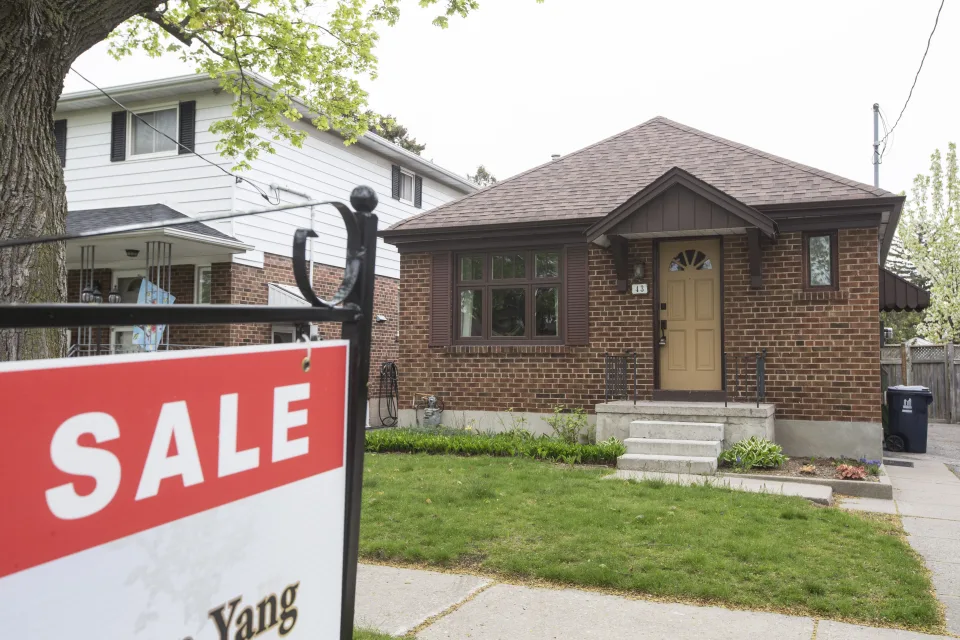Canada real estate: Home sales, prices plunge from highs as interest rates rise

The Canadian housing market continued to cool in June, with sales and prices falling in the wake of rising interest rates.
The Canadian Real Estate Association (CREA) said on Friday that sales in June fell 23.9 per cent compared to last year. Declines were across three-quarters of all markets in the country, led by the most populated areas, including the Greater Toronto Area (GTA), Greater Vancouver, Calgary, Edmonton and Hamilton-Burlington. Sales fell 5.6 per cent compared to last month, marking the fourth straight month of decline, although June's drop was more moderate than the ones seen in April and May.
The price of an average home has also fallen. CREA says the average price of a home in Canada fell 1.8 per cent compared to last June, coming in at $655,850. While that marks a moderate decline compared to 2021, the average price of a home has fallen sharply since the record highs hit in February. Prices have dropped more than $150,000, or more than 18 per cent, from February to June.
"Sales activity continues to slow in the face of rising interest rates and uncertainty," CREA chair Jill Oudil said in a statement. "The cost of borrowing has overtaken supply as the dominant factor affecting housing markets at the moment, but the supply issue has not gone away."
The MLS Home Price Index (HPI), which CREA says is a more accurate price comparison than the median or average price, declined by 1.9 per cent on a monthly basis. The decline is the biggest one-time going back to 2005, according to Bloomberg News. After stripping out sales in the GTA and Vancouver, Canada's two hottest housing markets, the average national price of a home was $541,350.
CREA says that most of the monthly sales declines were seen in Ontario, but it notes that prices have also eased in parts of British Columbia as well. The real estate group says prices are mostly flat across the Prairie provinces, while Quebec is now showing small signs of declines.
The number of new listings climbed 4.1 per cent on a monthly basis, largely due to an increase in supply coming out of Montreal.The slowing housing market comes as the Bank of Canada aggressively tightens monetary policy in the wake of skyrocketing inflation. This week, the Bank surprised markets and economists with a supersized 100 basis point hike, bringing the rate to 2.5 per cent. At the start of the year, the central bank's benchmark rate was sitting at 0.25 per cent. The hikes are sending borrowing costs up for Canadians, including those with variable-rate mortgages and home equity lines of credit.
BMO Capital Markets senior economist Robert Kavcic says the June sales figures show a housing market that is "seriously wobbling", before the Bank of Canada's full percentage point hike is factored in. "The period of extreme excess demand is essentially over, and we are on track for a very weak year ahead for resale volumes and prices," Kavcic wrote.
"The bottom line is that the market had already cracked after the BoC's initial move on rates, which only reinforces how sentiment-driven the market was. This week's 100 basis point rate hike sets us up for an even deeper correction through next year."
With the Bank of Canada warning of more rate hikes to come, TD's senior director of Canadian economics Randall Bartlett says "it's tough to see any relief coming any time soon for homeowners."
"The Canadian housing market continues to roll over as borrowing costs keep ratcheting up," he wrote in a research note on Friday. "Indeed, we are now of the view that there are roughly even odds of a recession in 2023, with residential investment providing the primary drag on the outlook.
Tags :
Previous Story
- Real Estate newsletter: $1 homes in Italy
- Al Ghurair Properties is leading a real estate...
- Real Estate newsletter: A Halloween house-and-horror combo
- Real estate agent opens new business focusing on...
- Turning 10 in a Record-Setting Real Estate Market
- Chinese regulators meet with developer Evergrande as scrutiny...
- ARA Dunedin to acquire InfraRed European Real Estate
- Five Keys To Growth For New Real Estate...